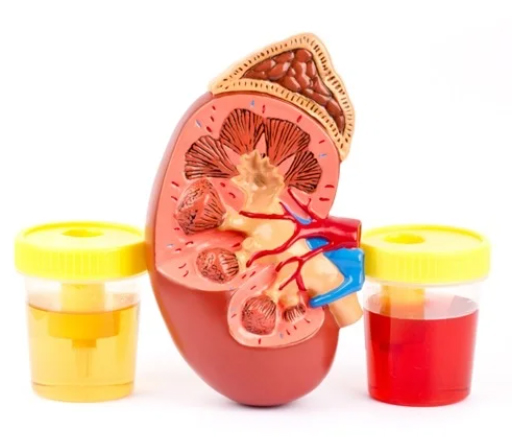Blood in Urine (Hematuria) – Expert Insights from Dr. Prabhu Karunakaran

Blood in urine, medically known as hematuria, can be alarming for parents. While some cases may be harmless, persistent or visible blood in urine may indicate an underlying medical condition that requires prompt evaluation by a specialist.
Types of Hematuria
- Microscopic Hematuria – Blood is present in urine but is only detectable under a microscope.
- Gross Hematuria – Blood is visible in the urine, turning it pink, red, or brown.
Causes of Blood in Urine
Hematuria in children can be caused by various conditions, including:
- Urinary tract infections (UTIs)
- Kidney infections
- Bladder or kidney stones
- Trauma or injury to the urinary tract
- Vigorous exercise
- Certain medications
- Blood disorders (e.g., sickle cell disease)
- Glomerulonephritis (inflammation of kidney filters)
When to Seek Medical Attention
Consult a pediatric urologist if your child experiences:
- Persistent or recurring blood in urine
- Painful urination or burning sensation
- Abdominal or back pain
- Frequent urination or urgency
- Fever along with hematuria
- Swelling in the legs, face, or around the eyes
Expert Care from a Pediatric Urologist
Dr. Prabhu Karunakaran, a dedicated Pediatric Urologist in Hyderabad, specializes in diagnosing and treating hematuria in children. His comprehensive approach ensures accurate diagnosis and effective treatment tailored to each child’s needs.
Diagnostic & Treatment Approach
- Detailed medical history and physical examination
- Urine tests to detect infections or abnormalities
- Blood tests to check kidney function
- Ultrasound or imaging tests for kidney and bladder evaluation
- Treating infections, stones, or underlying conditions
- Lifestyle and dietary modifications to prevent recurrence
Frequently Asked Questions (FAQs)
What is hematuria in children?
Hematuria is the presence of red blood cells in a child’s urine. It may be:
Gross hematuria – visible blood, turning urine pink, red, or brown
Microscopic hematuria – not visible, found only during urine testing
What are the common causes of hematuria in children?
Urinary tract infections (UTIs)
Kidney stones or crystals
Structural abnormalities (e.g., vesicoureteral reflux, obstruction)
Glomerular diseases (e.g., post-infectious glomerulonephritis, IgA nephropathy)
Inherited conditions (e.g., Alport syndrome, benign familial hematuria)
Trauma or strenuous exercise
Hypercalciuria (excess calcium in urine)
Is blood in the urine always a sign of something serious?
Not always. Some cases are benign and require only observation. However, persistent or recurrent hematuria, especially with other symptoms, may indicate kidney or bladder disease and should be evaluated by a pediatric urologist.
What symptoms should parents watch for along with hematuria?
Pain during urination
Frequent or urgent urination
Flank or abdominal pain
Fever (if infection is present)
Swelling or puffiness (may suggest kidney involvement)
High blood pressure
What tests are usually done to evaluate hematuria?
Urinalysis with microscopy – to confirm and quantify red blood cells
Urine culture – to rule out infection
Urine calcium and protein levels
Blood tests – kidney function, electrolytes, complement levels
Renal ultrasound – to check for stones, obstruction, or structural issues
Further tests (if needed): CT scan, cystoscopy, kidney biopsy
Can hematuria in children go away on its own?
Yes. In many cases, especially if due to mild infections, exercise, or irritation, it may resolve without treatment. However, follow-up is essential to ensure no underlying disease is missed.
When should a child see a pediatric urologist?
Gross hematuria lasting more than 1–2 days
Repeated microscopic hematuria
Associated symptoms (pain, fever, swelling, or high blood pressure)
Family history of kidney disease
Abnormal imaging findings
Is hematuria related to kidney disease?
It can be. Hematuria from the glomeruli (filters of the kidneys) may be a sign of glomerulonephritis or other nephropathies. These often require co-management by a pediatric nephrologist.
What treatments are available?
Treatment is based on the cause:
UTIs – antibiotics
Stones or hypercalciuria – hydration, diet changes, medications
Structural problems – surgical correction or observation
Glomerular disease – may require medications like steroids or immunosuppressants
In some cases, only observation is needed with regular monitoring.
Is hematuria in children preventable?
Not all types are preventable, especially those caused by genetics or immune factors. However, some risk can be reduced by:
Ensuring adequate hydration
Managing calcium intake appropriately
Treating infections promptly
Avoiding high-impact trauma to the kidneys

Schedule a Consultation
Early diagnosis is key to preventing complications. If your child has blood in their urine, book an appointment with Dr. Prabhu Karunakaran for expert evaluation and care.


